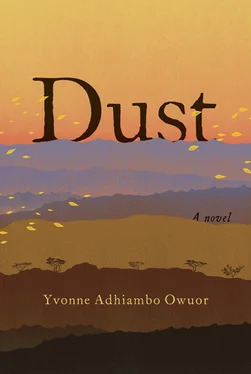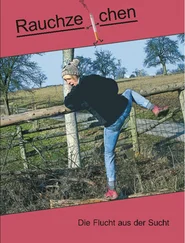Ajany now crawls under the bed, looks around, retrieves a rifle stored in a broken wooden box.
Baba had called her aside on the day she turned thirteen. “Choose one,” he had said.
She had looked at the weaponry. “Which one?”
“The one you like.”
She had chosen the prettiest one, an AK-47 with a Type 4B receiver. Baba weighed the rifle, winked at her, and handed it to her. “Now you’re ready for your wars.”
Ajany had spent three school holidays taking the rifle apart according to the lessons Baba had condensed for her.
Depress magazine catch. Remove magazine. Pull charge handle to rear. Is chamber empty? Press forward retainer button at rear of cover to remove it. Spring assembly forward. Lift, withdraw out of bolt carrier. Pull carrier assembly all the way to rear. Pull away. Push bolt, rotate bolt to clear raceway, pull forward and free. Click, click, and click .
Shooting lessons. Baba taught her how to aim and not move her shoulder back when a cartridge fired.
She lifts the rifle to her shoulder.
Afterward, Odidi had taken over the lessons. She remembers his hands on her shoulders, leveling her. Looking through the sights, she sees his body in the morgue. A bullet’s trajectory, and an incomplete statement: Cause of Death .
Ajany returns the gun to its hiding place, then races out of the hut, her body damp, mind whirling, and hands trembling.
The ranch gate swings wide.
Baba’s gone.
Galgalu the honey seeker sobs in a crouch. Because his soul has been profaned, because when he first saw the d’abeela he thought his father had returned to accuse him of all he had not done.
Ajany hunkers down next to him.
Galgalu’s horrified eyes — life’s layers shorn off.
She touches his shoulders, lifts the amethyst necklace from her neck, and slips it over his head. She touches the stone. Galgalu’s fingers close around it. Then, head on knee, Ajany listens to the land. They wait.

In the dusk of that bad day, Isaiah William Bolton arrived with a dust devil under the guardianship of a red-orange sunset that colored the twisted acacia tortilis gold. He showed up on the trail of nonstop weaverbird song, his athletic build drooped, and he reeked of fresh leather, cow dung, cow sweat, and cow saliva. He was unshaven and mottled. His haversack was stained, and his boots were red with dust. He had wrapped his jacket around his head: sun protection. Gray-edged curls were plastered on his forehead, and his lips were caked with white. He had croaked a call, “Is this Wot Ogyek?”
At the horizon, a train of camels, a line of sedate movement. Burbling of water, a brook’s language.
Passages.
A scorpion crosses Isaiah’s path from left to right, changes its mind, and heads for Isaiah’s foot. Isaiah jumps backward. Ultima Thule , he thinks. Totters. Tries again, “Er … hello, I’m here for Mr. Moses Ebewesit Odidi Oganda.”
Returning from the boma where he has secured the animals, Nyipir hears the precise pronunciation of Odidi’s name. He wipes his hands on his shirt, picks up his herding stick, and crosses the space, his right hand outstretched in greeting. Ajany, who is leaning against Odidi’s coffin, listens in.
A voice rumbles, “Afternoon!” With his hand out: “Isaiah William Bolton. I do apologize for showing up like this.” He clasps Nyipir’s hand, frowns. “Are you Moses?” He had imagined Moses Oganda to be much younger.
Nyipir stiffens, pulls his hand away, and takes a step backward, then another. He lifts and clings to his herding stick, plants it between them, and demands, “Your name?”
“Isaiah. Isaiah Bolton.”
Two steps back. “Who?”
Slowly, “Bolton.”
Nyipir’s side wind. “Bolton?”
“Yes.”
Ajany leaps up just as Nyipir zigzags away. “We can’t help you,” he shouts. He bumps into Ajany on his way to anywhere else, camouflaging his flight. “The camels.” He hesitates. “That man … there’s nothing here for him. Tell him to go away.”
Ajany approaches Isaiah, shading her eyes.
The light of the land emphasizes the jagged outline of his face, prominent jaw, symmetry of bones, shape of hazel-tinted eyes, and broad forehead. Gray-and-black hair flecks on powerful arms. He does not look like one who had come hunting for meaning among large East African creatures, nor does he have the messianic glint-in-eyes of “Love Africa” types. Does his haversack contain a problem — the “Mission Statement”? Was he a borehole builder? A poverty eradicator? Yet his look was desolate and distant, with a slight twist of distaste around his mouth. As if he would rather be elsewhere. Enshrouded in the mood of that day, she wants to paint him: movement of space around and about him, presence, hard restlessness, shades of sadness. The man and Odidi share height, broad-chested, muscled, towering maleness framed by a hauteur that is detached from and laughing at the world. Ajany squelches a fleeting urge to tug at the stranger’s face muscles. An old habit: it is how she built her knowledge of the shape and texture of faces, which she used to color in shadows that were the frame of a half-finished sculpture now abandoned in her Brazilian studio.
Annoyance.
Ajany chews on her fingernail. What face was she cursed to seek and never find? A breeze. She sniffed at the odour of stale cow emanating from the man and scowled. What did he want?
The wind tosses dust around.
Isaiah swats an armada of flies with big, impatient hands, flapping them like bat wings. He slaps dead some that had landed on his mouth. His mouth bleeds. Ajany’s lips tremble on an almost laugh.
Isaiah hunches. He wipes his forehead. This woman’s stillness perturbs , he thinks. And the afternoon of this land is much too hot, much too orange. And his thirst has reached such depths of concentrated anguish that even his eyelids ache. Who is she? Smallish, curved in the right places, barefoot, dust on shins and ankles, good legs. But under her scrutiny, he feels like a new and sentient specimen. He finds her gaze, an effort, and is transfixed by large, slanted, oval-shaped eyes from which wary questions spark. Hers is one of those faces made to be glimpsed through darkened windows on eerie stormy nights. She’s looking into his soul.
Inner shutters come down. He blinks and gestures. “What d-do you want?” he hears her ask, notes her stutter.
Isaiah lifts the coat from his head, noticing the part of the sleeve torn by a wait-a-bit bush. Isaiah picks at the thorns. A low-pitched rasp: “Did I offend him?” He shifts. “Unintentional. Really sorry.” Heat-tender skin. He needs to sit. Needs to sleep. Needs a pond to drink down. Had walked more than seventy kilometers. Had underestimated what “near Wuoth Ogik” meant.
He asks Ajany, “Am I at Wot Ogyek?”
“Wuoth Ogik,” Ajany corrects. “Who’s asking?”
“Isaiah William Bolton. Moses is expecting me.”
Rattle of secrets.
A name— Bolton . One of the many faces of the Gerasene demoniac, icon of the living dead. With tightness in her chest, Ajany will try to hasten Isaiah’s departure. “Moses isn’t here.”
“What? Oh dear!” Isaiah exhales, wipes his forehead again. “Where is he?”
She says, “You must leave. Before dark.”
A crack in his voice. “ Uh … no, please. Water? Please.” His eyes are dark with panic. “Please?” Softer-voiced.
Ajany hesitates before aiming for the water pump.
Isaiah walks a few steps behind her, stuffs his jacket into the haversack, and sniffs at the whiff of decay around the decrepit courtyard. Stomach rumble. He had shared three tins of truly awful corned beef and fermenting milk on the lorry, and left behind scissors, a shaving kit, and the remains of his expensive cell phone, which had tumbled out of his pocket and been lost between the hooves of thirty-five humped cattle. He had downed condensed milk on his long walk to Wuoth Ogik, while inside his bag some yellow curry powder and spices moldered. And all the time he traversed the arid district he hallucinated water, pure water, stream water, tap water, rainwater, bottled water, Evian water. Any water.
Читать дальше












